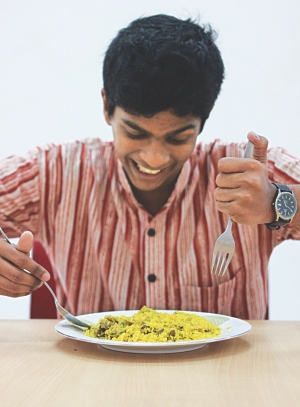| Campus Edibles
Have a Healthy Eid!
Saad Adnan Khan
Photo: Kazi Tahsin Agaz Apurbo
 Eid is the only day of the year when one repeats every single meal of the day at least twice (and sometimes more) without the slightest sense of awareness. Come to think of it, when does one actually take a break from eating on Eid day, especially the youths who are blessed with a large appetite? You wake up and go to a strenuous long prayer, which makes you hungry. You come back home and have breakfast, which is a combination of sweet (jorda, finni, shemai) and spicy (porota, chicken, tikea) food. Your neighbours or khalas drop by in the morning, who when are served delicacies made by your mother, you unwarily throw in some more food down your throat. Of course how can you get out of home without eating the khichuri or biriyani cooked by Ammu (mother) (the first lunch or brunch)? So you have some, and go to your friend's or cousin's place, where you end up having yet another brunch. In the afternoon you go to the traditional family gathering and have your nanu's (maternal grandmother's) korma and polau (the second lunch). Then you go out to get some snacks outside with cousins and friends. In the evening you have some cha (tea) and some more snacks, followed by dinner at dada's (paternal grandfather's) place. And after that you go to your chacha's (paternal uncle's) place to have the seemingly last dinner for the day. Eid is the only day of the year when one repeats every single meal of the day at least twice (and sometimes more) without the slightest sense of awareness. Come to think of it, when does one actually take a break from eating on Eid day, especially the youths who are blessed with a large appetite? You wake up and go to a strenuous long prayer, which makes you hungry. You come back home and have breakfast, which is a combination of sweet (jorda, finni, shemai) and spicy (porota, chicken, tikea) food. Your neighbours or khalas drop by in the morning, who when are served delicacies made by your mother, you unwarily throw in some more food down your throat. Of course how can you get out of home without eating the khichuri or biriyani cooked by Ammu (mother) (the first lunch or brunch)? So you have some, and go to your friend's or cousin's place, where you end up having yet another brunch. In the afternoon you go to the traditional family gathering and have your nanu's (maternal grandmother's) korma and polau (the second lunch). Then you go out to get some snacks outside with cousins and friends. In the evening you have some cha (tea) and some more snacks, followed by dinner at dada's (paternal grandfather's) place. And after that you go to your chacha's (paternal uncle's) place to have the seemingly last dinner for the day.
Sometimes of course people “have” to eat out of sheer politeness, and sometimes they do so simply because they love eating. Of course people should be hyped about all the Eid food, but they should also be aware of the amount of oil, ghee and butter they ingest. Now don't blame the food when you feel fatigued for all the impulsively gained weight or when you feel acquiescent to the calls of the nature at the end of the day.
Damage-control: You don't have to do much but plan well. What you need is a little bit of self-awareness and little less humility. You need to make sure that you don't have “too much” of anything any time of the day. In fact have everything moderately or less, because you have to eat all through-out the day even when you wouldn't want to. Start reducing the amount you intake as the day progresses. Drink water and homemade juices (avoid soft drinks), which will help you control your craving for calories because you will feel full. Of course there are aunts who take pride in serving spoon after spoon and wouldn't care the least about your displeasure of eating any more. You can use the tactic of taking small amounts of food in this case. Don't be over generous in giving compliments to your aunt, in case she takes that as a boost to serve more.
So eat in a planned, careful manner so that you don't have to hug people with a pot belly pushing through. And don't forget to sweat off all the calories you gained from the oily food during the month of Ramadan.
|
|
|
